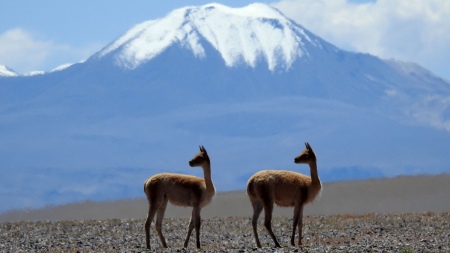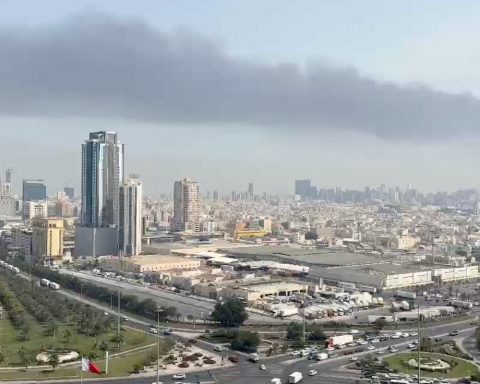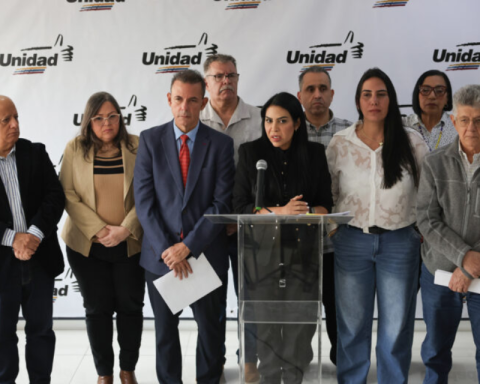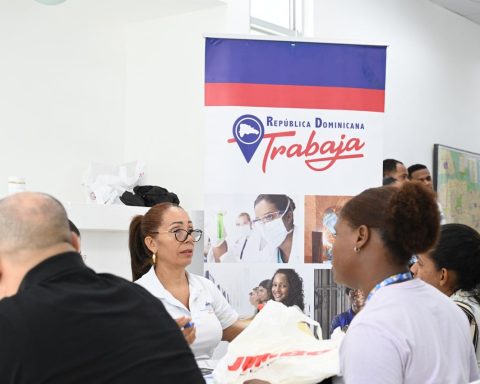Mountains, which hold between 60 and 80% of the world’s fresh water and are home to 15% of the population, especially indigenous communities, are “at risk” due to climate change and the advances in mining, warned a researcher within the framework of the International Day of Mountains that is commemorated this Sunday, in the year that the United Nations chose to promote their sustainable development.
“The mountain is super important because everything that happens in the valley, down the mountain, depends on what happens and happened months ago up the mountain”assured Télam Bibiana Vilá, Conicet senior researcher and representative in the Committee for the Sustainable Development of the Mountainous Regions of Argentina.
Vilá explained that the water from the rains and from the ice that melts in the mountains “channels into rivers” and stressed that between 60 and 80% of the world’s freshwater resources used for domestic, agricultural and industrial consumption comes from the mountains.
“One has to get rid of the idea that the mountain is hostile because the peoples have done incredible things in them”stressed the researcher about the contributions of these places in which “domesticated” products of common use for the populations such as potatoes, corn, quinoa and coffee.
The childhood of Bartolina Casimiro, a 52-year-old artisan from the Diaguita nation, it took place “high up” on the Anqcon Killaj mountain (Muñoz hill), from where he later emigrated to live in the lower area of Tafí del Valle, in the province of Tucumán.
“When we were kids we had our medicine, our firewood, animals, our little water that comes out of the mountain. The entire life system has been there,” he told Télam Bartolina and recalled that in that place “one lives freely” because “it is a very large territory”, where “there are no plots or restrictions.”

He also said that a practice of his ancestors endures over time, “the minga” (exchange), where those who lived in the mountains went down “with donkeys loaded with meat, leather, spun wool and returned with donkeys loaded with fruit, sugar, grass.” “It was a much healthier, healthier life,” she recalled.
For communities and indigenous peoples, mountains have a place within their worldviews and spiritualities.
In the community of Bartolina, the mountains “have great importance” because that is where their worldview comes from. “Everything that is our universe, our house,” shared the artisan, who pointed out that her grandparents performed the ceremonies at the top since it is where “they have lived thousands of years” and where “there has been life.”

The mountains, occupying 27% of the planet’s land surface, they house approximately half of the world’s reserve of biological diversity, according to data from the Food and Agriculture Organization of the United Nations (FAO).
Also, these sites possess 30% of all Key Biodiversity Areas and “many mountains have grassland ecosystems that are very important for ‘sequestering’ carbon,” Vilá said about the ecological function of these places.

Nevertheless, are ecosystems vulnerable to climatic events such as melting glaciers and anthropogenic impacts such as deforestation or mining and, with respect to climate change, snow cover, glaciers and permafrost in all mountainous areas are expected to continue to decline in almost all regions over the throughout the 21st century.

“On the one hand there is climate change: Glaciers are shrinking all over the world, it is an inescapable reality. And the other issue is open pit mining that breaks mountains and uses a lot of water. In addition, the water has the quality of not being contaminated in the mountains and the effect of mining contaminating it is very serious,” the researcher said.
2,200 kilometers away from the Anqcon Killaj mountain, in the Chubut city of Esquel, is Evis Millán, a member of the Mapuche people and of the lof “Pillan Mawiza”, which in Mapuzungun means “sacred mountain”, in the sense of “a very important place where spirits dwell” and that extends for about 150 hectares ten kilometers from the city.
His people recognize the “ngen” as spirits that “regulate the energy and harmony of a place” and they are the protectors of rivers, streams and mountains, among other places.
“They lived thousands and thousands of years and they take care of the place. That ‘ngen’ somehow manifests itself to protect the place. She lives there, cohabits, knows how to protect it,” explained Millán, who is also a member of the Movement of Indigenous Women and Diversities for Good Living.
for her is “extremely important to take care of the mountains as a people” because they understand that “life is there” and highlighted the need to “recover ancestral knowledge” and “save these spaces” to protect them and “begin to heal and inhabit as it should be.”

To protect the mountains, Vilá asked “Think about the rights of communities to a healthy environment and the environmental costs of different productions”while he highlighted the need for “specific policies for the lifestyle in the mountains” that contemplate connectivity, the layout of roads, a trade with “fair prices” and the incentive to activities without environmental impact.
“We defend them so much and We do not want extractivist companies to come and harm them because that breaks with our whole way of life,” concluded Bartolina.
The United Nations assured in a statement for International Mountain Day 2022 and its theme ‘Women move mountains’, which is about “an opportunity to promote gender equality and therefore contribute to improving social justice, livelihoods and resilience.”
“We must recognize women as protagonists in the mountains”
The women of the communities that inhabit the mountains play a “fundamental” role for the protection of the environment, knowledge and the development of their way of life, for which it is “necessary” to recognize them as “protagonists” of these places, assured the researcher Bibiana Vilá, in line with the motto of International Mountain Day 2022: “Women move mountains”.
“Women must be recognized as protagonists in the mountains,” she assured Télam Vilá, who is the Conicet representative in the Committee for the Sustainable Development of the Mountainous Regions of Argentina.
Vilá maintained that women who live in the mountains are usually the “keepers of knowledge, especially of the mountain way of life” and explained that many of them are “pastors and farmers, as well as caregivers for children and the elderly.”
“For me it is very important as an indigenous woman to protect these forces of the mountains. Sometimes they are considered only as resources, but for us they are like beings who have their strength and with whom we co-inhabit this territory,” said Marilyn Cañio, a 30-year-old Mapuche member of the lof Cerro León, located in the town of El Maitén, in the northwest of the province of Chubut.
For her, “the protection of these beings is important, the reciprocity that exists with the strength of the territory because they also protect us.”
A “problem” that exists in the mountains is “emigration”, generally of young men as a result of the difficulties in selling mountain products and thus ensuring their livelihood, and also because of their way of life, said Vilá, who She is also a professor in the Department of Social Sciences at the University of Luján and director of the Vicam research group (vicuñas, camelids and the environment).
In this process, the mountains “feminize and age,” highlighted the researcher, for whom “it is very common to have rather elderly women and mothers of children” in these places.
“These women are alone and produce handicrafts, llama fiber, they are shepherds, farmers and in some way guarantee food security. They stay and support themselves. They are key to strategies against hunger, malnutrition,” he explained.
For this reason, he considered that policies that contemplate this reality and recognize the role of women in the mountains are “necessary”.
In this sense, he listed some claims: “The equal ownership of land by men and women, that women are consulted when there are undertakings and when there is a development proposal, it is essential that women have a voice.”


















